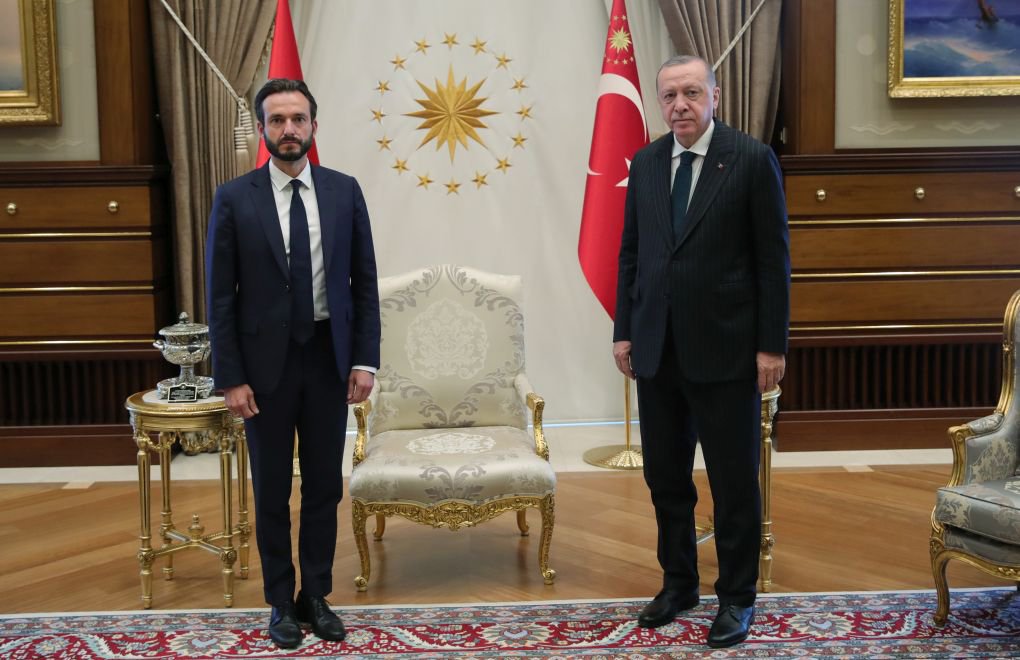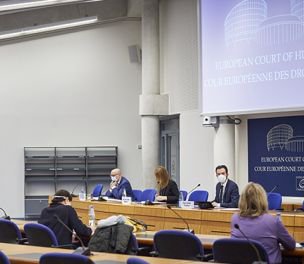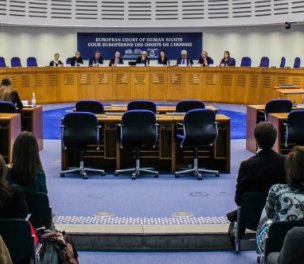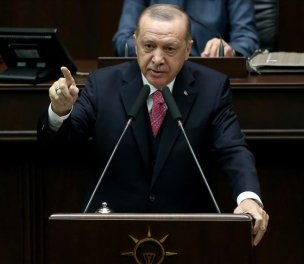* Photo: Murat Kula - Ankara / AA
Click to read the article in Turkish
European Court of Human Rights (ECtHR) President Robert Spano made a speech in the "24th Term Training of Prospective Judges and Prosecutors" organized by the Justice Academy of Turkey today (September 3).
Spano also met President and ruling Justice and Development Party (AKP) Chair Recep Tayyip Erdoğan in a closed-door meeting at the Presidential Complex in the capital city of Ankara. While the meeting took 45 minutes, it was also attended by Minister of Justice Abdulhamit Gül.
'Turkey's association with ECHR is a long one'
In his speech at the Justice Academy, Robert Spano underlined that "the rule of law was the lodestar" of the European Convention on Human Rights (ECtHR). "Turkey's association with the European Convention on Human Rights has been a long one," he noted.
Underlining that "this was his first official visit to Turkey as President of the ECtHR and it was a privilege to be giving human rights lecture" in Turkey, Spano emphasized the importance of the principle of rule of law:
"The rule of law, is the lodestar of the Convention system, the shining star guiding us forward. It constitutes the legal and moral foundation of our work along with the fundamental principles of democracy and human dignity."
He also stressed "the role played by domestic judges in building and preserving a democratic society governed by the rule of law."
Referring to the history of the ECHR system, he further said:
"Firstly, 2020 is a very important year for the Convention system. We are celebrating 70 years since the European Convention on Human Rights was signed in Rome on 4 November 1950. Turkey's association with the European Convention on Human Rights has been a long one. A founding member of the Council of Europe, Turkey was one of the original signatories, ratifying the Convention on 18 May 1954.
"We have achieved a lot in the last 70 years, but what is absolutely clear is that the values of the Council of Europe, as enshrined in the European Convention on Human Rights, are as important and relevant as they have ever been, indeed perhaps more so."
Relation between rule of law and human rights
Elaborating further on the principle of rule of law, Spano said that "both the Convention and the Turkish Constitution embed the concept of the rule of law and respect for human rights as foundational constitutional pillars." Afterwards, he offered the following definition of the rule of law:
"But what do we mean by rule of law? While there is no abstract definition of the rule of law in the Court's case-law, the Court has developed various substantive guarantees which may be inferred from this notion.
"These include the principle of legality or foreseeability, the principle of legal certainty, the principle of equality of individuals before the law, the principle that the executive cannot have unfettered powers whenever a right or freedom is at stake, the principle of the possibility of a remedy before an independent and impartial court and the right to a fair trial. Some of these principles are closely interrelated and can be included in the categories of legality and due process.
"They all aim at protecting the individual from arbitrariness, especially in the relations between the individual and the State."
ECtHR President Robert Spano also explained the core idea behind the rule of law briefly as follows:
"I would, however, submit to you that the core moral idea behind the rule of law within a democratic society as envisaged by the Convention is the respect for the personal autonomy of human beings. In order for a person to be able to retain and nurture independence of thought, to be able to manage his or life as he or she wishes, to understand his or her communal responsibilities, to be able to strive for happiness, success and inner peace, all core elements of human existence, it must conceptually be of great importance that the society in which that person lives is governed by the force of law which is transparent, stable, foreseeable and allows for mechanisms of dispute resolution that are independent and impartial."
Reference to 'foreign investment'
Against this backdrop, Spano also drew a line between the existence of rule of law and economic development and welfare: "Moreover, sustained economic development and prosperity requires States to be governed by the rule of law. A dysfunctional judiciary in a society which does not uphold the rule of law and human rights will not attract foreign investment.
"The rule of law, by requiring that governmental power be regulated by law and not the whims and caprice of men, thus demands that laws are clear, not vague and open to abuse, that laws are not applied retroactively so as to limit unduly the autonomous choices made by members of society based on existing rules, and that laws be interpreted and applied by independent and impartial institutions different from those that promulgated the laws.
"Those in power cannot therefore control the courts. To put it clearly, laws must not only apply to the populace, but also, and crucially to those that hold the reins of power at any given moment. Ladies and gentlemen, no man or woman is above the law."
Independence of the judiciary
Further in his speech, Spano elaborated on the independence of the judiciary as well as the people's trust in the judiciary.
"This point of principle is quite simple: in a State governed by the rule of law, final and binding judgments of courts must be executed without exception," he said and added:
"The same applies to judgments of the European Court of Human Rights by which a State is bound under international law. Thus, the State's respecting the authority of the courts is an indispensable precondition for public confidence in the courts and, more broadly, for the rule of law."
In reference to the failed coup attempt in Turkey on July 15, 2016, Spano said, "We have also received applications brought by judges from Turkey who complain under Article 5 about detention after the attempted military coup on 15 July 2016."
Accordingly, he shared the following observations:
"The case-law of the Court makes it very clear that the detention of judges is strictly scrutinised by the Court. In the judgment in Alparslan Altan, the Court, for the first time within the context of Article 5, relied on the following three elements in its strict assessment of the legality of the detention:
"Firstly, the special role in society of the judiciary, which, as the guarantor of justice, a fundamental value in a State governed by the rule of law, must enjoy public confidence if it is to be successful in carrying out its duties;
"Secondly, where domestic law has granted judicial protection to members of judiciary in order to safeguard independent exercise of their functions, it is essential that such arrangements should be properly complied with;
"Thirdly, given the prominent place that the judiciary occupies among State organs in a democratic society and the growing importance attached to the separation of powers and to the necessity of safeguarding the independence of the judiciary, the Court must be particularly attentive to the protection of members of the judiciary when reviewing the manner in which a detention order was implemented from the standpoint of the provisions of ECHR."
'Rule of law is an empty vessel...'
Concluding this part of his speech, Spano said: "Therefore, although I of course take no position on the outcome as such, some of the language adopted by the Turkish Constitutional Court in a recent judgment does not seem to fully reflect the spirit of constructive judicial dialogue which we have come to expect between our Court and the highest superior courts.
"To conclude this part of my intervention ladies and gentlemen, allow me to recall what I said in a recent lecture. The principle of the rule of law is an empty vessel without independent courts embedded within a democratic structure which protects and preserves fundamental rights.
"In the Convention system, independent and impartial courts have a fundamental role to play in guaranteeing that democratic actions retain their true character by being truly inclusive and respectful of individual rights. Without independent judges, the Convention system cannot function." (AS/SD)












-132.jpg)